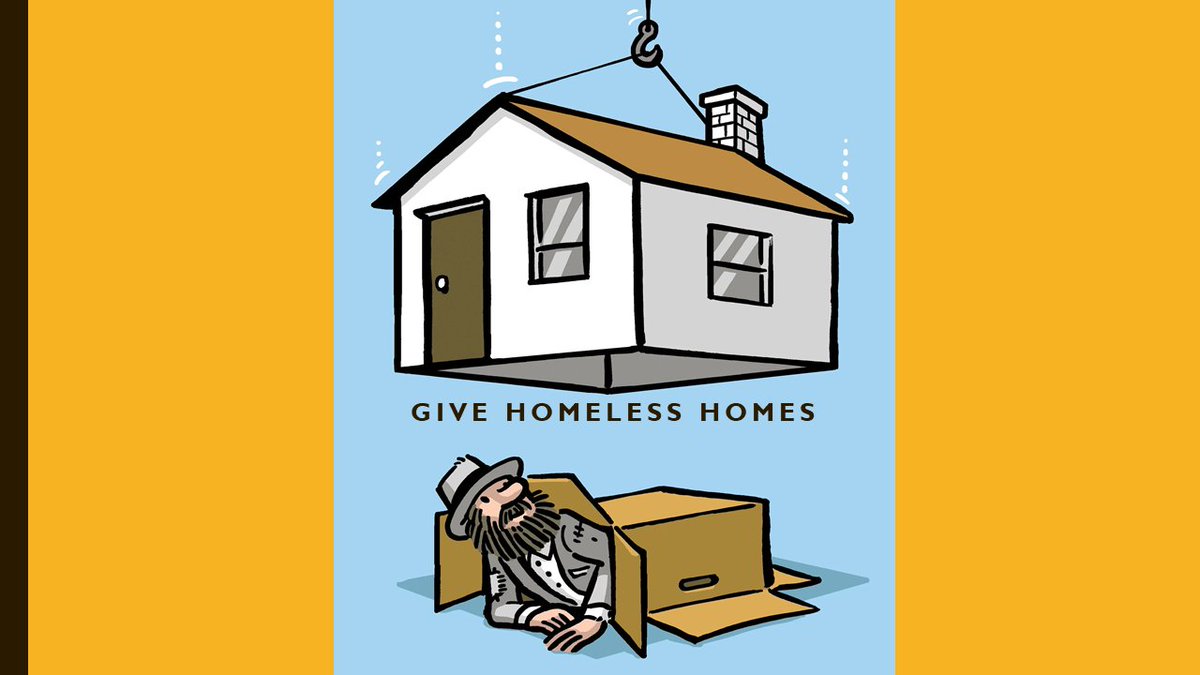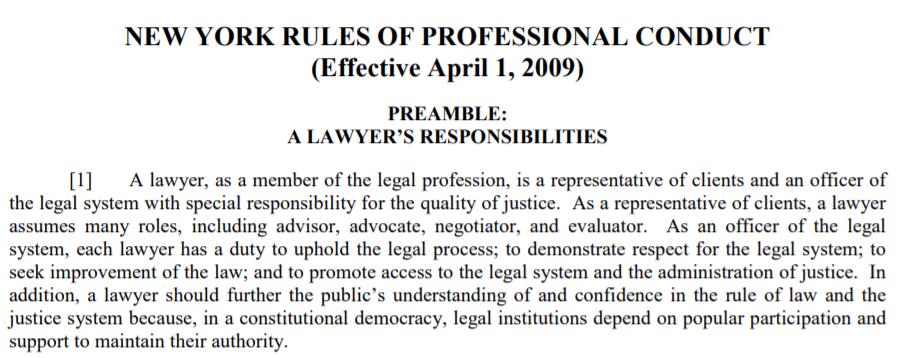
Criminalization of Persons Experiencing Homelessness:
This thread answers:
➡️What is criminalization?
➡️Who are persons experiencing homelessness?
➡️Does it work?
➡️Is it Constitutional?
➡️What does work?
➡️Why do they do what they do? (They = those who criminalize)
1/
This thread answers:
➡️What is criminalization?
➡️Who are persons experiencing homelessness?
➡️Does it work?
➡️Is it Constitutional?
➡️What does work?
➡️Why do they do what they do? (They = those who criminalize)
1/
Poor people are human beings, all of whom have implicit worth and dignity. A human being was inside tent being disposed of by sanitation crew in San Diego and not discovered until tent in garbage truck and hydraulic compactor about to activate. 2/ sandiegouniontribune.com/news/watchdog/… 

Being poor and living on the streets or in temporary shelter is it's own punishment. Persons experiencing homelessness are experiencing social isolation, trauma, mental illness, substance abuse, deprivation of basic necessities and physical, sexual or emotional abuse. 3/ 

What is criminalization? Many have sought to attack the term, calling it a political label intended to inflame fears and incite prejudices. This is false. Criminalization is a legal term of art used by scholars and experts in the field and has a precise definition. 4/ 

Criminalization refers to the laws prohibiting or severely restricting a human being's ability to engage in necessary life-sustaining activities in public, even when there is no reasonable alternative. 5/ 

Not every jurisdiction in the US criminalizes persons living in homelessness but California does considerably. Of the U.S. cities with the most homelessness, California cities are three of the top five and six of the top ten. 6/ 



This graphic shows the prevalence of anti-homeless laws across cities in California by offense category. 7/ 

And in this graphic we see how vagrancy arrests correlate to the California economy. Next, lets examine more closely the anti-homeless laws that are collectively referred to as Criminalization. 9/ 

Laws prohibiting sleeping: overnight camping, illegal lodging, loitering, encroaching, vehicle habitation. No matter where persons experiencing homelessness choose to sleep in public space, there is a corresponding crime for which they can be cited. EVERYONE SLEEPS. 10/ 

San Diego has one or more laws prohibiting camping citywide and one or more laws prohibiting sleeping in particular public places. San Diego leads with other California cities in this statewide trend punishing human beings for the act of sleeping in public space. 11/ 

Laws criminalizing loitering punish poor people who stop moving to temporarily rest but do not have access to private space to do so. EVERYONE LOITERS. 12/ 

San Diego has one or more laws prohibiting loitering, loafing and/or vagrancy in particular public places as do 60% of the cities in California. Since 2006, these laws have increased by 103% 13/ 

Some cities aggressive policing of loitering, trespass, vehicle habitation and unlawful lodging ordinances has led to federal lawsuits, civil settlements and consent decrees. Operation Street Sweeper in Olcala, TX is one such example. 14/ 

Which of these activities have you done on a city sidewalk which, if you had been experiencing homelessness, could have subjected you to arrest or prosecution? 15/
#poll #AskMe
#poll #AskMe
Laws punishing encroachment were intended to punish businesses leaving bags of trash on the sidewalk. When protesters camped out in public space the law was first used to force them to disperse. Now, a law intended for rubbish is applied to homeless persons on the sidewalk.
16/
16/

Because the city was unable to provide adequate temporary options for persons experiencing homelessness in San Diego, federal lawsuits have restricted the hours that San Diego police can enforce the encroachment laws in certain locations and imposed other prerequisites.
17/
17/

Laws criminalizing homelessness force persons experiencing homelessness to move out of sight to avoid police harassment and farther from dwindling supply of public restrooms. How far would you walk to find a restroom? And how would you protect your belongings while you did? 18/ 



Homeowners who believe homeless persons are peeing on their lawns should challenge their elected officials to make more public restrooms available. Most citations for public urination in San Diego are issued to drunk bar patrons after bars close and not to homeless persons. 19/ 

The lack of access to clean water and sanitation led to the death of 20 persons in San Diego due to Hepatis A, 13 of whom had been experiencing homelessness. The grand jury blamed the City for not providing adequate access to clean water and sanitation.
20/
20/

EVERYONE PEES and POOPS. I've previously debunked the specious claim criminalization is somehow necessary because "their shit gets in our water supply." It's a shitty, unsupported argument that scientists have soundly disproven. 21/ See: 
https://twitter.com/objkshn/status/1312904657161785344?s=20

San Diego makes it a crime not just to take something from a public trashcan, but even touching the trash, without taking anything, can be punished as a crime. EVERYONE TOUCHES TRASH, but only persons experiencing homelessness find themselves cited for this law. 23/ 

San Diego is not alone in punishing scavenging; 76% of California cities do. My client cited for scavenging was found guilty at trial but fined $0. The recycling he removed from the can had been headed for landfill as the city does not offer recycling cans at beach. 24/ 

EVERYONE EATS but there are those who believe if hungry persons experiencing homelessness are not given any food, homelessness will end. To promote their "starvation strategy," these persons advance laws that punish others more compassionate than they. 25/ 

El Cajon, California, made it illegal to provide free food to a stranger and arrested a dozen persons who disobeyed the law to feed persons in a public park. After international outrage, the cases were dismissed and the law was repealed. 27/ 

In Kansas City, health department officials with the blessing of the Mayor poured bleach on top of food that volunteers were distributing to persons experiencing homelessness. In California, 9% of cities punish or restrict public food sharing. 28/ 

EVERYONE ASKS FOR HELP but laws punishing panhandling criminalize persons experiencing homelessness when they ask strangers for help. As with food sharing laws, there are those who think that helping those who ask for help "could lead to a fatality."
29/
29/

Have you ever asked a stranger for money, a free ride or offered to work in exchange for free food? 30/
#Poll #AskMe
#Poll #AskMe
65% of cities in California have one or more laws prohibiting begging in particular public places. San Diego does not prohibit panhandling but other laws which punish such persons for existing in public space could be invoked. 32/ 

EVERYONE COVERS THEMSELVES when they are cold but Pensacola, FL made it a crime. Pensacola Police confiscated blankets from cold persons experiencing homelessness, but not from cold fans at sporting events or cold vacationing beach goers. 34/ 
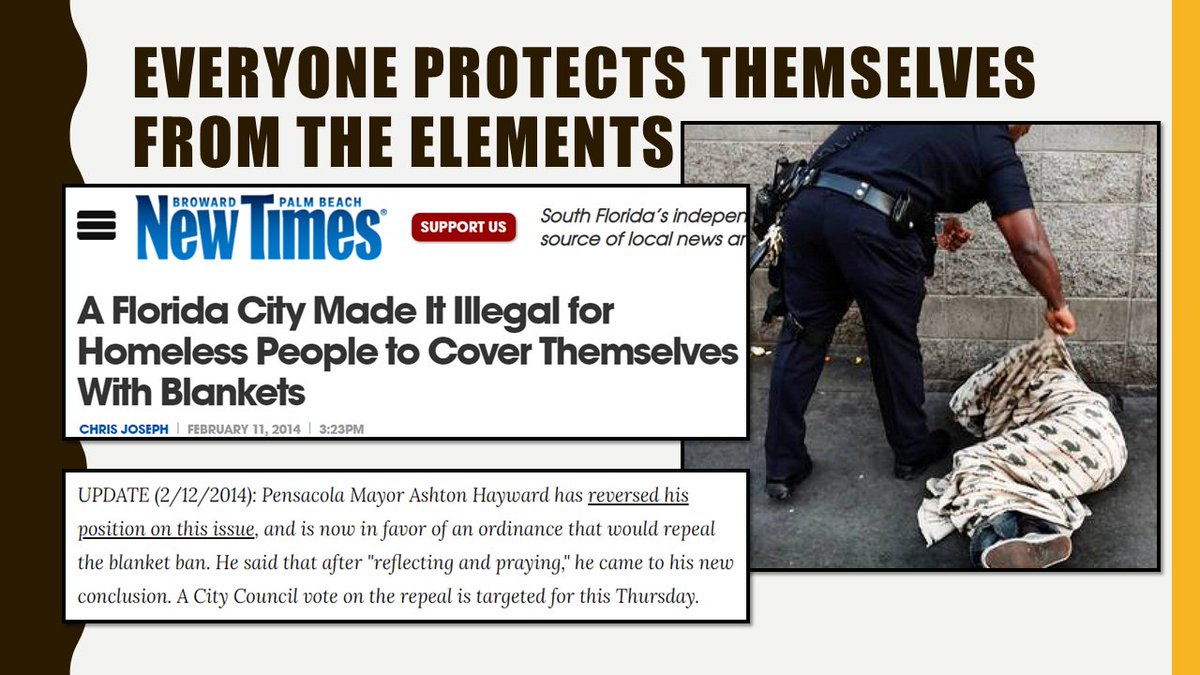
EVERYONE HABITATES when they occupy their vehicle, but persons experiencing homelessness are punished for doing so. Homeless people who are are punished for habitating in a vehicle are forced to instead live on the streets.
35/
35/

Watch body worn camera video.
Man experiencing homelessness parked vehicle to use public bathroom and was cited for vehicle habitation. Telling him "they don't want you here," officer threatened to cite the man whenever he saw him near his vehicle. 36/
Man experiencing homelessness parked vehicle to use public bathroom and was cited for vehicle habitation. Telling him "they don't want you here," officer threatened to cite the man whenever he saw him near his vehicle. 36/
At trial, the officer did not present the body worn camera evidence and instead repeatedly testified that he came upon the man while the man was sleeping in his vehicle. As a result, the man was convicted. An appeal was filed. 37/ voiceofsandiego.org/topics/public-…
On appeal, the body worn camera video was produced and the man the officer falsely cited now has the dubious distinction of being the only person in the country charged and convicted of an infraction and later exonerated. I defended this man pro bono to achieve this result. 38/ 



Although investigated by Internal Affairs, the discipline of the officer by his employer, if any, was not publicly released. He was not prosecuted for perjury. He was referred for possible inclusion on The Brady List, a list of officers with compromised credibility. 39/
Cited four times for vehicle habitation by the same officer, this man became one of several plaintiffs in a federal lawsuit filed by Disability Rights California. The federal court granted a motion to enjoin enforcement of the law pending outcome on the merits. 40/
To get around the injunction, City Council repealed the challenged law and enacted a new law. In this way, police can use new law to harass persons experiencing homelessness multiple times before ever issuing citation where law can be challenged. 41/ See: nbcsandiego.com/news/local/tim…
The law creates two sets of parking rules: one for those with residences and one for those without.
For 12 hours all persons-without-homes-but-with-cars must sleep in same Safe Lots.
During the other 12 hours entire sections of the city are off limits to them, only.
42/
For 12 hours all persons-without-homes-but-with-cars must sleep in same Safe Lots.
During the other 12 hours entire sections of the city are off limits to them, only.
42/
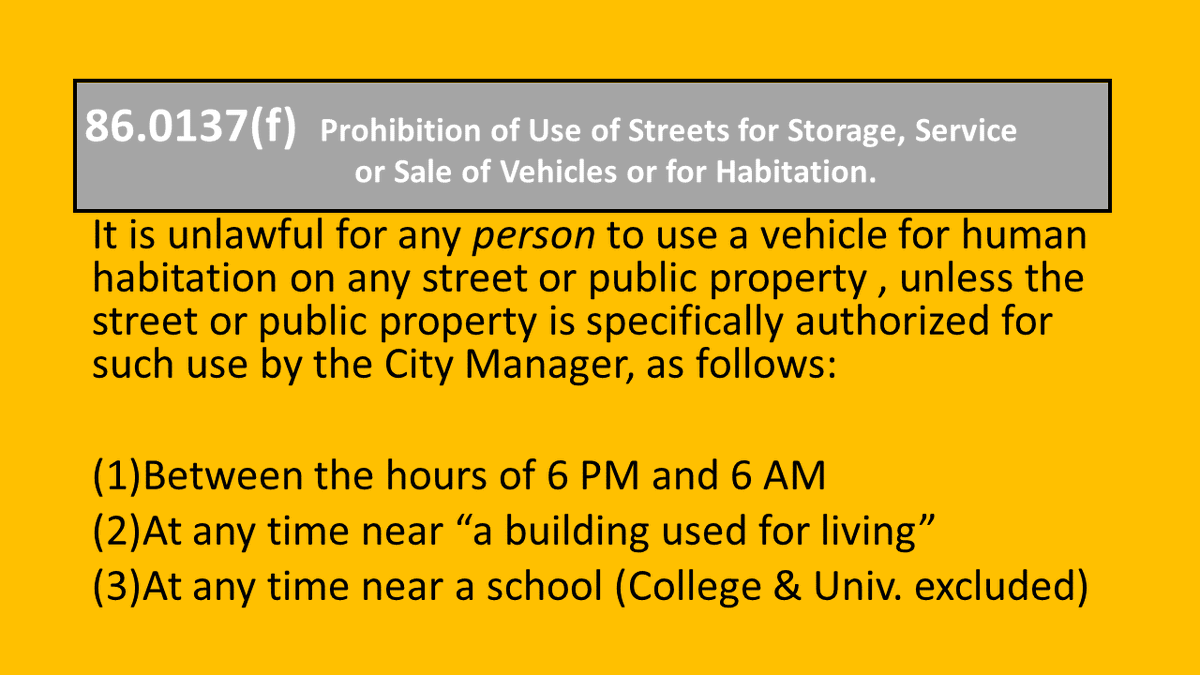
Taking a nap is evidence San Diego police could use to cite the nap-taker for habitation in a vehicle. The law, at least on it's face, applies to all persons equally but, as enforced, is selectively used against persons who cannot prove they have a residence. 44/ 

The Vehicle Habitation ordinance further directs police that any of the following items, if observed in a vehicle, can be used as evidence of vehicle habitation. 45/ 

If your car was searched right now, would it contain any of these items: sleeping bag, blanket, sheet, pillow, kitchen utensils, cookware, camping gear, food, water, or containers of feces/urine (i.e. dirty diaper)?
46/ #Poll #AskMe
46/ #Poll #AskMe
San Diego is not alone in laws restricting living in vehicles; half of the cities in California have such laws and since 2006, there has been a 213% increase in such laws.
(Reminder: Bandwagon fallacy is believing something correct just because many others doing it.) 47/

(Reminder: Bandwagon fallacy is believing something correct just because many others doing it.) 47/


The belongings of people occupying public space can be taken and destroyed. Belongings in a car can be evidence of a crime. Carrying these belongings can interfere with mobility. Yet homeless storage locations are unpopular, frequently opposed and rare. 48/ 

Who does criminalization target? There are many myths of homelessness that proliferate and paint an incorrect picture of the population. Politicians cannot fix a problem that is not adequately defined. Who are persons experiencing homelessness? 49/ 

Homeless persons include children, the elderly, the sick, the poor and those with disabilities. It remains the moral test of our government to treat them all with decency and dignity. (Photographed, Voices of Our City Choir.) 50/
cc: @VoOCCSD
cc: @VoOCCSD

Which group do you think represent the largest number of persons experiencing homelessness in San Diego 2020?
51/ #Poll #AskMe
51/ #Poll #AskMe
Which group actually represents the largest number of persons experiencing homelessness in San Diego 2020?
Families.
Not all homeless persons are chronically homeless, veterans or youth. Most are families. Our solutions to homelessness should reflect this reality.
52/
Families.
Not all homeless persons are chronically homeless, veterans or youth. Most are families. Our solutions to homelessness should reflect this reality.
52/

While there are homeless residents experiencing housing insecurity throughout San Diego County, the largest number (64%) are residing in the City of San Diego. 53/ 

Systemic racial injustices intersect with homelessness with the result that in San Diego (2020), Black residents experiencing housing insecurity are represented six times greater than in the general population. 54/ 

San Diego racial disparities in its population of those experiencing homelessness is slightly larger but consistent with national averages. 55/ 

That Black persons are also over-represented amongst those living in poverty does not explain the much greater extent to which they are represented amongst the population experiencing housing insecurity. 56/ 
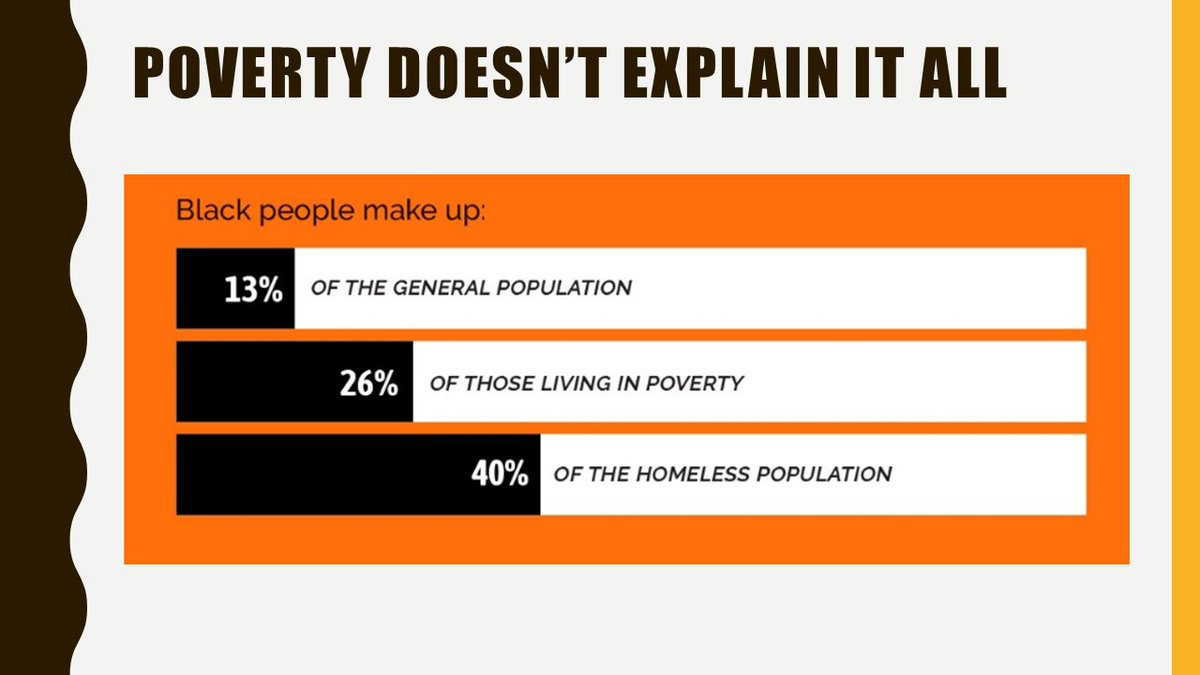
Persons with a disability are only 10% of the general population but 58% of those persons experiencing housing insecurity in San Diego (2020). Of the unsheltered homeless population, 21% are disabled due to mental illness and 18% have substance abuse disorder. 57/ 

People with disabilities are disproportionately homeless.
1 in 85 adults with disabilities experienced sheltered homelessness compared to 1 in 344 adults without disabilities. 58/
1 in 85 adults with disabilities experienced sheltered homelessness compared to 1 in 344 adults without disabilities. 58/

As much as a third of persons experiencing homelessness are hospitalized during a given year and they often are served through emergency rooms which are cost ineffective. People without housing five times more likely to be admitted to hospital than other populations. 59/ 

There are 659 youth under the age of 24 who are experiencing housing insecurity in San Diego (2020); 41% have been without housing for a year or longer. 35% of 18-24 year olds are attending school. Criminalizing these youth isn't helping them any. 60/ 

Half of youth experience homelessness for first time when asked to leave the home by parent or caregiver. A quarter of homeless youth are fleeing violent households. Most do not have the option to return home. 40% are homeless due to families disapproval of LGBTQ identity. 61/ 

Youth identifying as LGBTQ represent 7% of the general population but 40% of the homeless population and 40% of the juvenile detention population. 62/ 
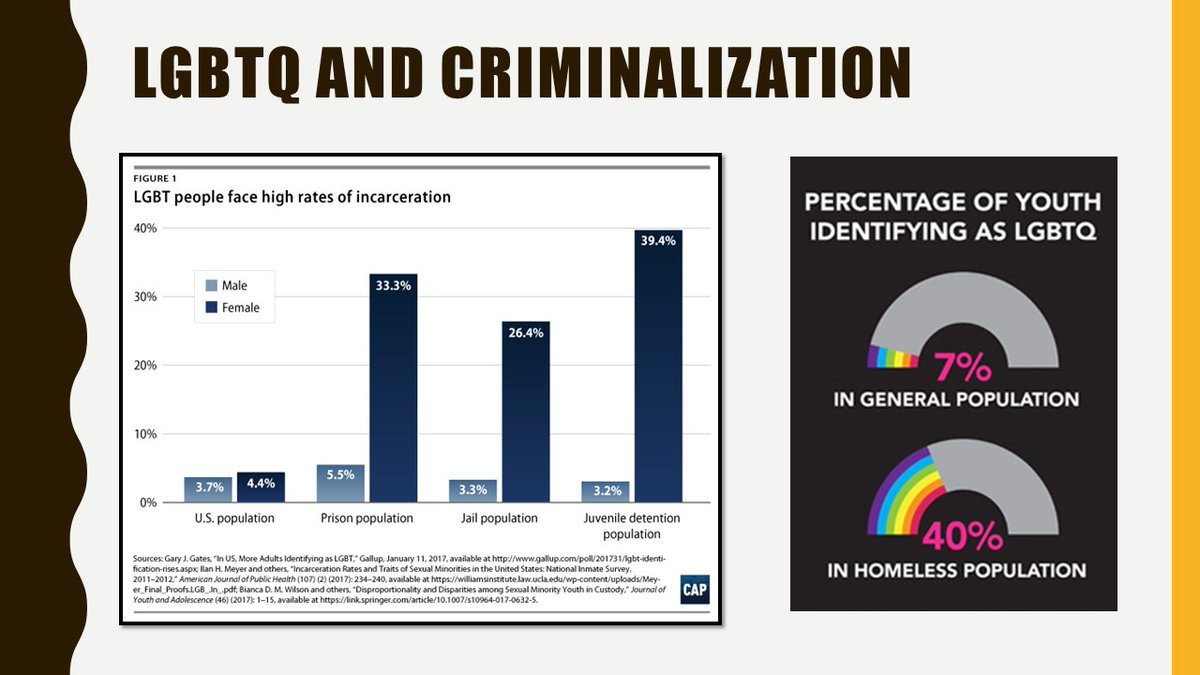
In addition to the laws criminalizing all homeless, police have other age-based status offenses, such as curfew, truancy and runaway laws, that are used to entangle otherwise law-abiding youth with the juvenile and criminal justice systems. 63/ 
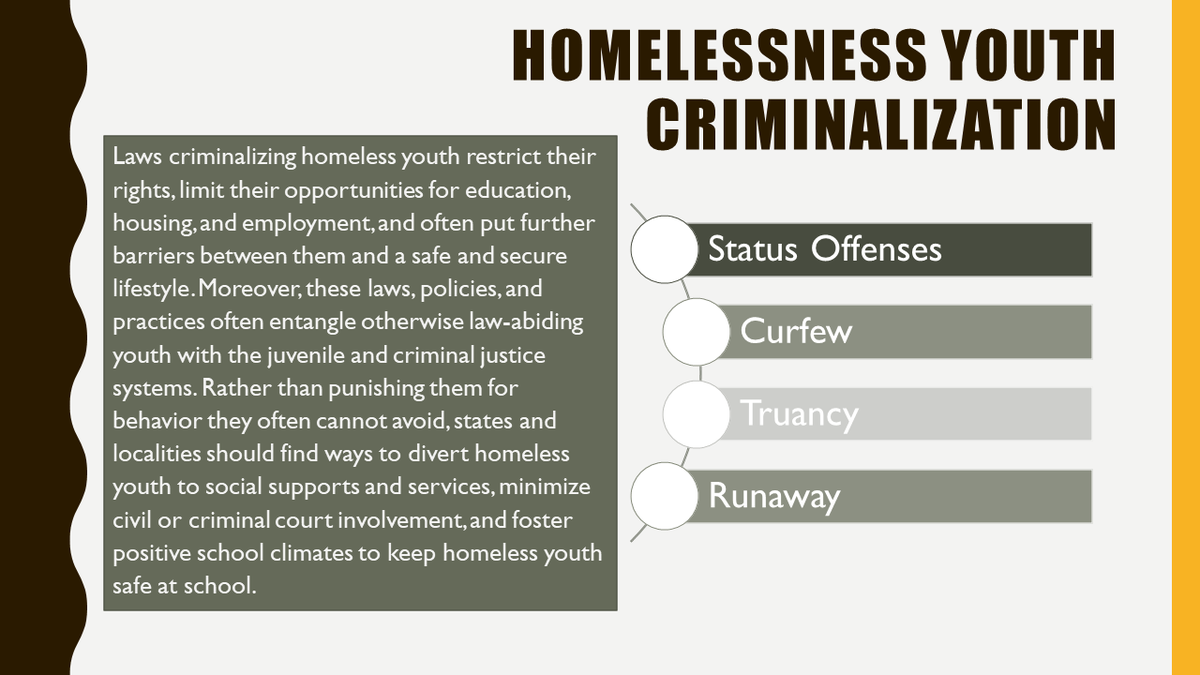
What percent of persons experiencing housing insecurity would you guess are employed?
64/ #Poll #AskMe
64/ #Poll #AskMe
If you thought 40% of persons experiencing housing insecurity are unemployed you'd be correct. However, many are surprised to learn so many homeless hold jobs. Work schedules often make it more difficult for employed persons without housing to find shelter or safe lot space. 65/ 

Nearly half of the entire U.S. renter population is cost-burdened, spending over 30% of incomes on housing and 71% of of extreme low income households spend over 50% of their income on housing. The cost-burdened are one emergency away from likely homelessness. 66/ 
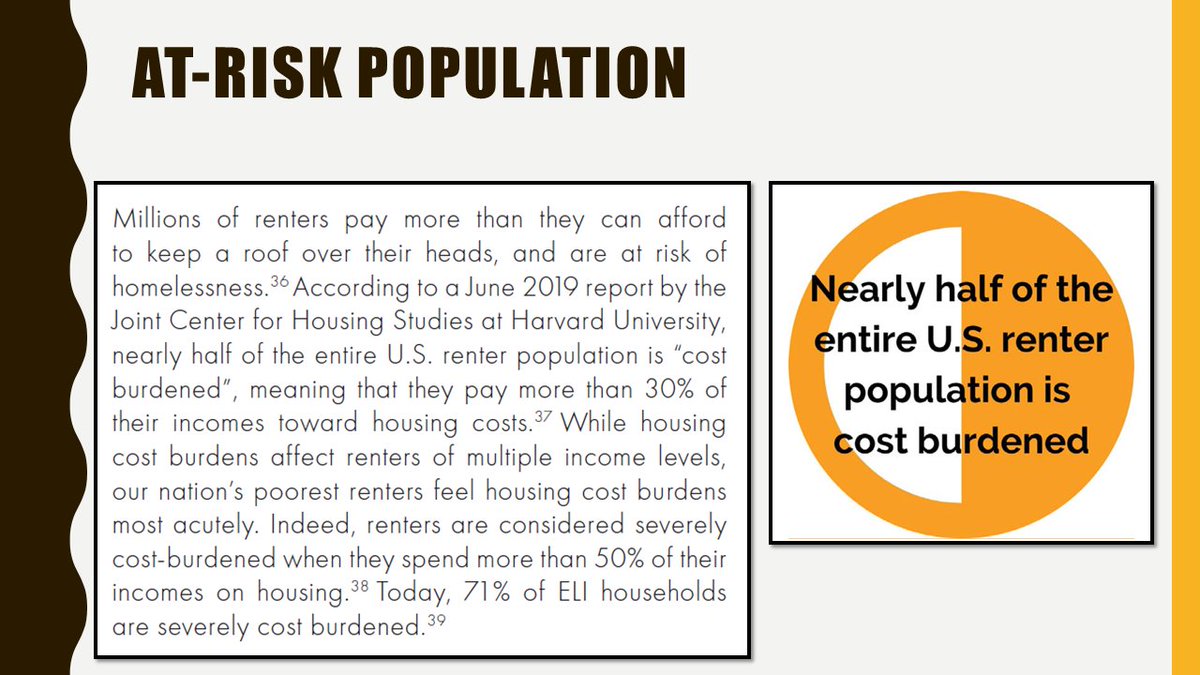
Blaming homelessness on the person who is homeless allows the government and social service agencies to escape blame & accountability, assuring the crisis will continue in perpetuity. Homelessness is primarily caused by lack of affordable housing and housing discrimination. 67/ 

For what purpose do governments advance for laws that criminalize certain members of the community who have the least? The purposes advanced do not withstand scrutiny. 68/ 

The stated purposes for the vehicle habitation ordinance as claimed by the prosecutor, was
(1) to uphold sanitation
(2) for public safety
(3) to prevent visual blight
As noted, these purposes do not withstand scrutiny. 69/
(1) to uphold sanitation
(2) for public safety
(3) to prevent visual blight
As noted, these purposes do not withstand scrutiny. 69/

CRIMINALIZATION IS CONTRARY TO PUBLIC SAFETY. The American Medical Association opposes laws criminalizing homelessness for the risk they pose to human life. Laws criminalizing homelessness that contribute to human suffering do not serve, but instead frustrate, public safety. 70/ 

The city's failure to provide public toilets and handwashing stations was cited as contributing to Hepatitis A crisis in which 20 persons died including 13 homeless persons. Laws criminalizing the homeless will not improve, but frustrate, sanitation. 71/ 
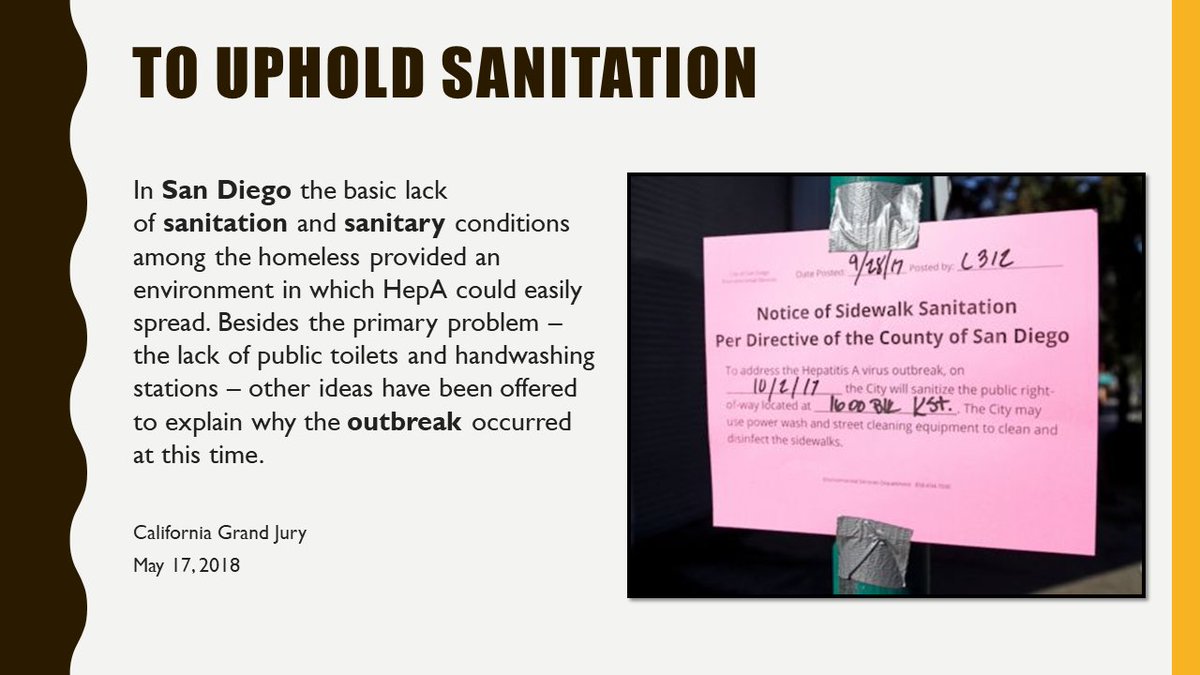
The argument advanced by some that persons experiencing homelessness shit contaminates the public water supply as a justification for criminalization is shitty and debunked in this prior thread: 72/ 
https://twitter.com/objkshn/status/1312904657161785344?s=20

With criminalization, homeless persons are pushed further into the shadows, restricting their access to safe water and increasing their risk. CDC recommends placement of sanitation stations at homeless encampments, not their arrest and disbandment enabling spread of disease. 73/ 

VISUAL BLIGHT (preventing ugliness) cannot be used to justify denying persons their dignity and freedom to exist in public space. Prosecutors train volunteer community members to tag neighbors for violations, a recipe for conflict. 74/ 

VISUAL BLIGHT is subjectively determined. Property that government deems "unsightly and in disrepair," can be removed placing considerable discretion on enforcement officials to target poor persons and have their visually unappealing property confiscated. 75/ 

Criminalization benefits persons who manipulate public law to promote their self-interested choice not to be in the vicinity of a certain class of people. Criminalization makes the police glorified "porch sweeps," called to sweep the ugly from the view of the more affluent. 76/ 

Laws criminalizing other human beings are tools of the police weaponized for use against the most vulnerable in the community. These tools deny agency and autonomy, and compel human beings with the fewest resources to constantly move elsewhere, always out of view.
77/
77/

If criminalization is to be used as a tool to get homeless to move out of public space, what happens when there are inadequate alternative space available? Isn't punishing persons who have nowhere they can exist lawfully, cruel? 79/ 

IF NOT HERE, WHERE? Move along orders happen regularly and frequently, operate as an invisible penalty, communicate to persons experiencing homelessness that others have more entitlement to public space than them and leads to other tangible and intangible losses and injuries. 80/ 



21,400 persons experiencing homelessness were offered one-way tickets out of town if they signed agreements to self-exile and never to return. Any reduction a city achieves by busing its homeless residents out of the city is offset by those persons being bused into the city. 81/ 

Some people oppose assisting the local homeless population on the basis that they are transplants from elsewhere who have arrived to take advantage of the moderate weather. However, at least 74% of San Diegans who are homeless became homeless while living in San Diego. 82/ 

Criminalization can lead to court-issued stay away orders, compelling persons experiencing homelessness to avoid entire areas of the city. These stay away orders can prevent persons from receiving food or services and frustrate the ability to find and obtain housing. 83/ 

Stay away orders don't reduce homelessness but add to it. Violation of stay away orders provides police with yet another tool in their toolbox to compel persons without housing to keep moving without regard to the access they require for food, shelter or other services. 84/ 

Hostile architecture like the "extra sharp and jagged rocks" that the Mayor of San Diego paid $57,000 to install (pictured below, lower right) is another tool cities use who seek to displace and hide the homeless population from view. 85/ voiceofsandiego.org/topics/governm…. 

Some cities, instead of criminalizing persons or directing them to move without destination, have instead permitted the creation of visually appealing, cost-effective and environmentally friendly tiny home communities for temporary or permanent housing options. 86/ 

The Block Project in Seattle, WA is a community-building pre-fabricated housing project. This holistic approach pairs volunteer homeowners with residents and a social worker, and houses persons experiencing homelessness without criminalizing them first. 87/ 

Temporary shelters and temporary encampments offer temporary solutions and should only be undertaken with explicit plans for how persons living in these locations will eventually be placed into permanent housing. 88/ 

But just because there are temporary shelter beds available does not mean those beds are functionally available to all persons experiencing homelessness. There are many barriers that prevent their use or render them inappropriate. 89/ 

Safe parking lots offer a temporary solution for persons experiencing homelessness who have vehicles. As with shelters, these spaces may not be functionally available to all. 90/ 

There are inadequate safe parking spaces provided by the city of San Diego to accommodate those unsheltered but who have a vehicle population. These locations do not accommodate for homeless persons who work in the evening or those who reside in RVs. 91/ 

Preventing homelessness by enacting strong renters' rights is more effective at reducing housing instability than threatening persons experiencing homelessness with citation or arrest should they become homeless. Criminalization does not serve general deterrence principles. 92/ 
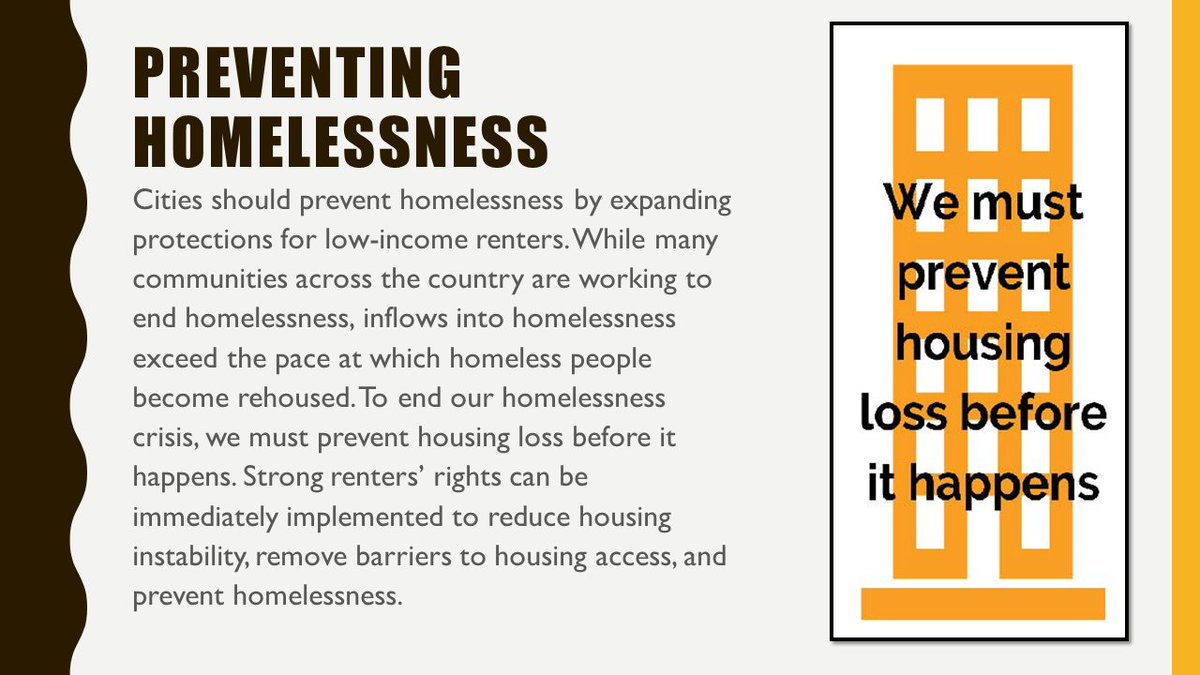
Is criminalization effective?
SHORT ANSWER: Hell, no.
Criminalization actually makes homelessness worse.
Let's examine how and why.
94/
SHORT ANSWER: Hell, no.
Criminalization actually makes homelessness worse.
Let's examine how and why.
94/

In meta analyses, criminalization was determined ineffective in reducing homelessness. Criminalization was found to allow community members to eschew their moral obligation to homeless residents, to target them for vigilante justice and banish them from society. 95/ 

THE EFFECTS OF CRIMINALIZATION ARE DEVASTATING TO PEOPLE AND COMMUNITIES. Criminalization of homelessness contributes to mass incarceration and further perpetuates racial injustice. 96/ 

Criminalization with its collateral consequences leads to extended homelessness and does not reduce homelessness. 97/ 

A cascade of harmful consequences make eventual housing even less likely for those subjected to criminal penalties for homelessness. 98/ 

Criminalization of homelessness perpetuates poverty & harms public safety. These laws erode trust between homeless people and police, heightening the risk of violent confrontations between police and unhoused people and leaving homeless people more vulnerable to vigilantism. 99/ 

Criminalization is expensive! Santa Clara County spent $520 million a year for five years to criminalize its homeless; $2.5 billion could have housed a lot of people instead of paying the criminal justice system to keep sweeping them away. 100/ 

CRIMINALIZATION IS EXPENSIVE AND COUNTER-PRODUCTIVE. It's nearly ten times more expensive to hold a homeless youth behind bars for a year as it would be to rescue that homeless youth from the streets. 101/ 

On average, one day in jail costs $87 whereas a shelter bed costs $28. Los Angeles paid 89 million to its police department for one year of criminalization. Obscene payouts to police and jails create a co-dependency for the agency to maintain or expand criminalization. 102/ 

In contrast to the obscene costs of Criminalization, Housing First strategies realize demonstrated savings and successes. Florida saved $21K for each chronic homeless person it housed and Los Angeles saved 6.5 million after a year of Permanent Supportive Housing. 103/ 

Placing people in housing reduces ER visits, inpatient admissions and psychiatric costs. Criminalization leads to the opposite. 104/ 

The Department of Housing Continuum of Care Program provides grant funding to communities and restricts funding for jurisdictions that do not commit to stop criminalizing homelessness. 105/ 

Criminalization of homelessness and sweeps does not help but instead harms public health. My blind elderly client recovering from cancer surgery had her medication, hospital instructions and encroachment citation discarded after police posted a notice she couldn't see. 106/ 

Criminalization of homelessness breeds distrust between homeless persons and police. This distrust leads to increased violence between police and homeless persons, decreased cooperation of homeless persons in investigations, and less reliance by homeless persons on police. 107/ 

Criminalization of homelessness empowers violent acts by vigilantes. An estimated 13,000 unhoused individuals die on the streets each year as a result of violence. 108/ 

Criminalization of homelessness leads to death. No hyperbole. Unsheltered homeless are likely to die 20 to 30 years earlier than their housed counterparts. 109/ 

Criminalization of homelessness causes sleep deprivation which contributes to psychosis. Police, by never letting persons experiencing homelessness rest in public space or sleep, but instead keep them in constant fear of being chased away cause prolonged sleep deprivation. 110/ 

CRIMINALIZATION ISN'T JUST HARMFUL, IT IS INEFFECTIVE, COSTLY AND OFTEN ILLEGAL. Defending the legality of criminalization efforts in federal court is time consuming and costly. Criminalizing persons can prolong their homelessness or make this status permanent. 111/ 

LAWS CRIMINALIZING HOMELESSNESS ARE ROOTED IN PREJUDICE, FEAR AND MISUNDERSTANDING AND PRIORITIZE BUSINESSES AND HOUSED OVER THE NEEDS OF UNHOUSED NEIGHBORS. It's dangerous to allow those with vast resources to spread lies and falsehoods prejudicing those with the least. 112/ 

Stop stereotyping homeless people. Politicians cannot solve homelessness without an appreciation of who persons experiencing homelessness are, . . . and are not. Promulgating myths makes it easier to dehumanize and blame persons but not to end homelessness. 113/ 
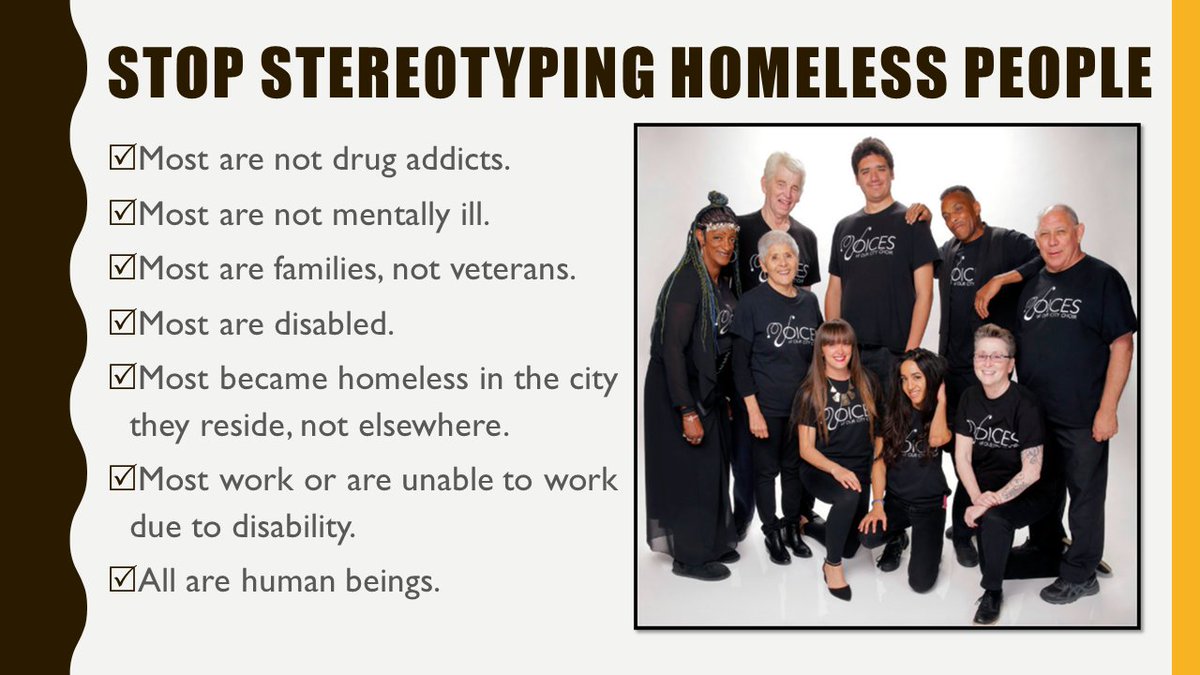
Criminalization of Homelessness is a matter of serious concern under international law. California's criminalization practices violate our obligations under Internationally agreed upon treaties and covenants. 114/ 

The premise of Housing First is to place people in housing without pre-condition and then to provide voluntary services that they both need and want to help keep them in housing long-term and permanently. 117/ 

Housing Readiness v. Housing First
In Housing Readiness model, persons must successfully complete programs before being deemed deserving of housing assistance.
In Housing First persons placed in housing without pre-condition and then provided supportive services. 118/
In Housing Readiness model, persons must successfully complete programs before being deemed deserving of housing assistance.
In Housing First persons placed in housing without pre-condition and then provided supportive services. 118/

When people have a home, they spend less time in hospitals, police custody and shelters, resulting in vast savings. Ten persons in ten homes for six months will realize a cost savings to the City of $668,000. 119/ 

Around the country, implementation of Housing First strategies realized reductions in costs, arrests and emergency room visits. In Marin County, California, Housing First approach resulted in a 28% reduction of chronic homelessness. 120/ 

Training police officers how to de-escalate mental health incidents in Miami-Dade County, Florida enabled 10,000 persons experiencing mental illness to be stabilized or placed in services, cut the jail population by 40% and saved nearly $12 million per year. 121/ 

Everyone deserves a right to rest without being forced to constantly move. Support "Right to Rest" legislation that recognizes the right of all people to exist in public space without condemnation or criminalization and oppose discrimination based on one's housing status. 123/ 

Is criminalization constitutional? HELL, NO! But practical impediments to challenging these local ordinances prevent their constitutionality from being reviewed by a court, permitting police and prosecutor to perpetuate their unconstitutional enforcement in the interim. 125/ 

Laws criminalizing a housing insecure person for acts of necessity and survival are cruel, counter-productive, unconstitutional and immoral. 126/ 

When governments seek to interfere with religious institutions' charity to persons experiencing homelessness, they infringe on the Free Exercise of Religion under the First Amendment of the US Constitution. 127/ 

Courts have held city ordinances that prevent individuals and groups from food sharing violate state-based religious freedom statutes, as well. 128/ 

A court found food sharing laws prevented a Ft. Lauderdale charity from promoting message "all persons are equal, regardless of socio-economic status, and that everyone should have access to food as a human right," and thus violated First Amendment Freedom of Expression. 129/ 
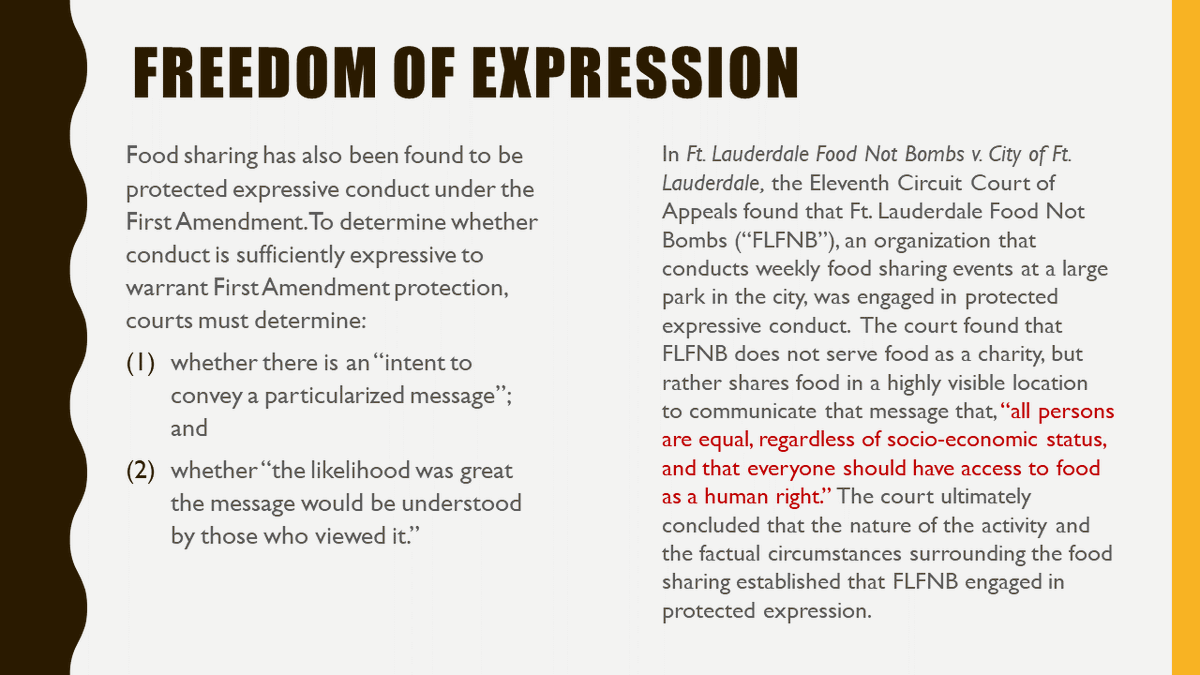
The right to beg for assistance is protected under First Amendment Freedom of Speech provision of the U.S. Constitution. 130/ 

Courts have recognized that homeless persons have a protected possessory interest in their property under the Fourth Amendment, preventing government from unreasonably searching, seizing and/or destroying it. 131/ 

Punishing someone for involuntary status as homeless alcoholic violates Eighth Amendment as a cruel and unusual punishment.
In photo, San Diego police cruelly awaken persons who found shelter from rain near a library closed due to COVID and direct them back into the rain. 132/
In photo, San Diego police cruelly awaken persons who found shelter from rain near a library closed due to COVID and direct them back into the rain. 132/

Leilani Farha, Special Rapporteur to the United Nations on Adequate Housing, who has toured the world to observe and report on conditions of homelessness, said of what she saw in her recent visit to California, "There's a cruelty here that I don't think I've seen." 133/ 

Recently, the Ninth Circuit Court of Appeals held, in Boise v. Idaho, it was Cruel and Unusual to arrest or punish persons for sleeping on public property when the City did not provide adequate and relatively accessible indoor accommodations. 134/ 

Stipulated injunctions, achieved as a result of civil court challenges, can secure moratoriums on enforcement, create due process protections, and impose standards on the suitability of alternate accommodations. 135/ 

In an effort to rid the city of visual blight, police target the vehicles of persons experiencing homelessness for ticketing, then impound the car for unpaid tickets. In Smith v. Reskin, a California court found this practice posed a serious question that needed resolution. 136/ 
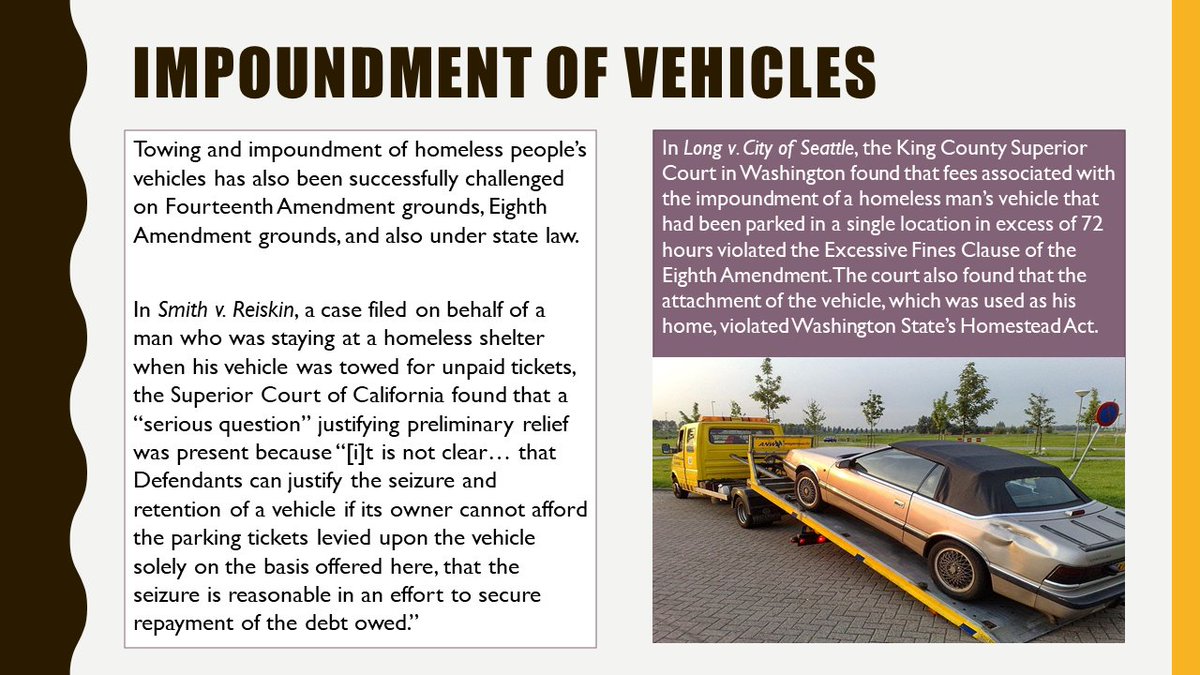
Many people engage in the same conduct as homeless persons (like those pictured camping out for next iPhone) but yet are never cited. Selective enforcement of laws that punish one group and exclude others unjustifiably is unconstitutional as violation of Equal Protection. 137/ 

Crimes criminalizing homeless punish the acts of survival and not homeless status because convicting persons of their status as homeless is unconstitutional. Yet, at trial, police and prosecutors routinely introduce evidence of homeless status to secure convictions. 138/ 
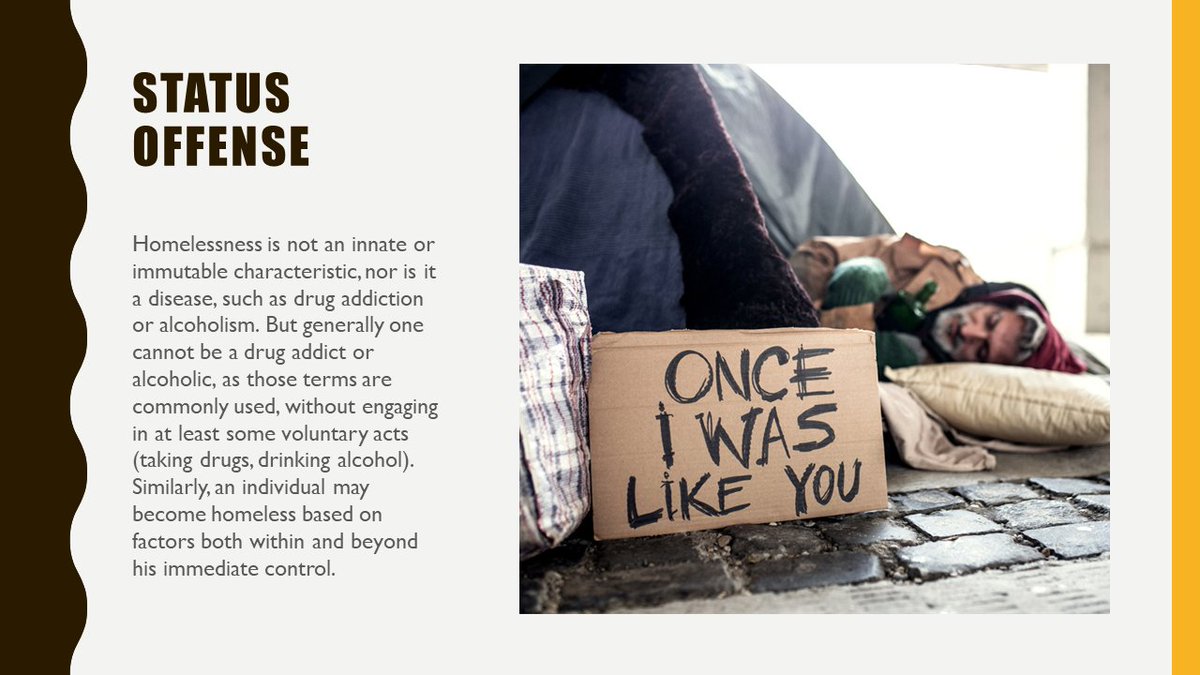
Vague laws are unconstitutional because they fail to alert the public as to what behavior is prohibited and invite selective enforcement of the law. The Vehicle Habitation ordinances in Los Angeles and San Diego have been challenged as unconstitutionally vague. 139/ 

What constitutes encroachment on a public sidewalk? Groups of drunk patrons, lines down the block and stacks of scooters are not targeted for enforcement yet a person experiencing homelessness who stops on a sidewalk to place an item recently purchased in a suitcase is? 140/ 

Vague laws invite arbitrary power. When laws apply broadly to conduct that everyone does (i.e. napping in a vehicle) vague laws allow police to apply the power arbitrarily against some people and not others. 141/ 

Freedom to loiter for innocent purposes is part of the "liberty" protected by the Due Process clause of the Fourteenth Amendment. 142/ 

Due Process requires, at a minimum, notice and an opportunity to be heard before the government can deprive a person of their property interest. This means police cannot confiscate and dispose of property without posting notices such as depicted in the first photo. 143/ 
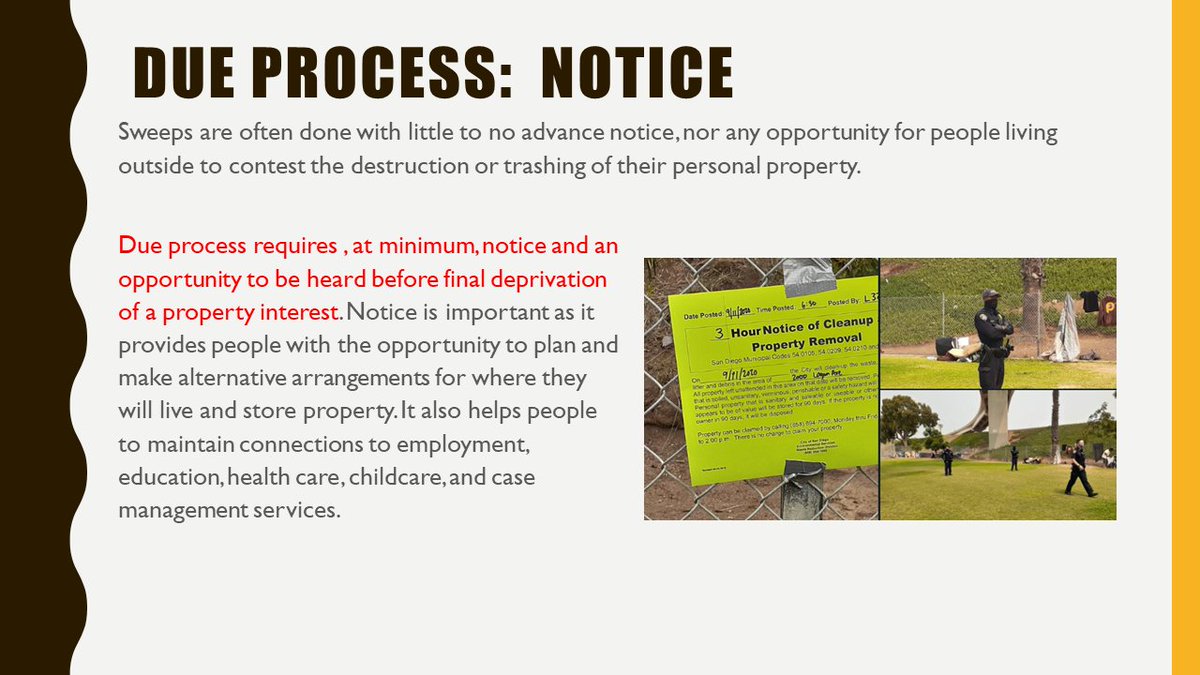
A lawsuit filed in Charleston, West Virginia, following the dismantling of a homeless encampment without prior notice resulted in the imposition of standards for notice, due process and reasonableness for the manner in which future such government intrusions are conducted. 144/ 

The combined effect of the enforcement of statutes against homeless persons force them to travel against their will and, conversely, to limit their travel into certain regions of the city or country due to their status. This violates their constitutional right to travel. 145/ 
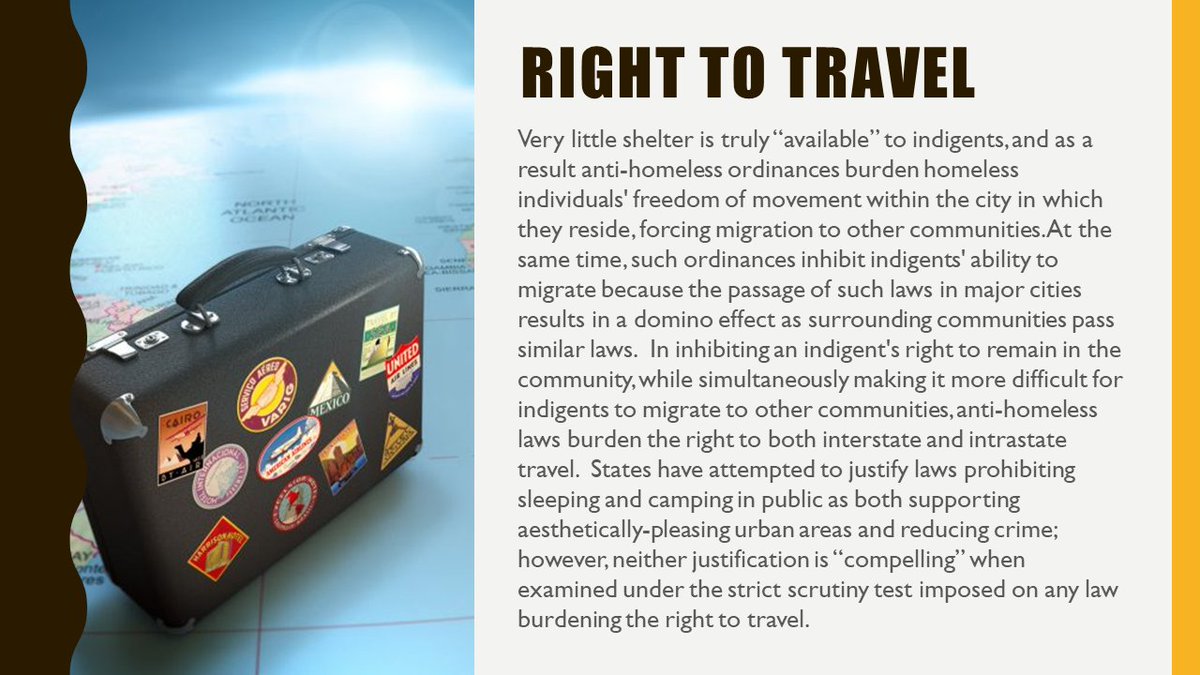
In addition to violating U.S. Constitutional law, criminalization measures also violate international human rights law, specifically the Convention Against Torture and the International Covenant on Civil and Political Rights. 146/ 

The International Covenant on Civil and Political Rights (ICCPR) recognizes the right to life which includes the right to shelter oneself from the elements. 147/ 

Advocates for homeless rights are also using the spotlight of international human rights officials to bring attention to the Right to Adequate Housing and to reframe the local and national conversation. 148/
cc: @LeilaniFarha @Make_TheShift
cc: @LeilaniFarha @Make_TheShift

Thank you for your patience. Our last question to answer in this thread is "Why do they do it"? This section is not concerned with the motivation of persons experiencing homelessness but the motivation of persons who would seek to criminalize them for acts of survival. 149/ 

Being homeless is a misfortune, not a crime. How we treat people who are experiencing homelessness IS a crime. Here, we'll examine the criminological deviancy of the policy makers who would elect to criminalize human beings experiencing homelessness. What makes them tick? 150/ 

Not In My Back Yard (NIMBY) is a wholesale embrace of selfishness. That humans retreat to selfish self-interests is to be expected but our public servants entrusted with the power to create and enforce laws should rise above such base tendencies for the greater good. 151/ 

YIGBY: Yes in God's Backyard
There are people and community groups that reject selfishness and use their resources to make the community better. All public servants should be similarly motivated and not succumb to the pleas of the selfish. 152/
There are people and community groups that reject selfishness and use their resources to make the community better. All public servants should be similarly motivated and not succumb to the pleas of the selfish. 152/

Complaint-Oriented Policing elevates rights of the selfish, permitting the selfish to use police services to move people experiencing poverty out of their view. Elected officials should refuse to legitimize this selfishness and police should not respond to these complaints. 153/ 

32% of the 9-1-1 dispatches related to homelessness in San Francisco were placed by BIDs. Many corporate-operated Business Improvement Districts (BIDs) seek to improve their districts by using police to exile all homeless-appearing persons from its boundaries. 154/ 

300 years ago, a poem by Bernard Mandeville, "The Fable of the Bees: Private Vices Public Benefits" was widely circulated and sought to justify selfishness, greed and corruption as necessary to a vibrant economy and the happiness of all bees in the hive. 155/ 

This writing, popular in its time, and excerpted here, described how the bees who thrived in luxury and ease, were plentiful and vast, and all sought to satiate each other's desires for "lust and vanity." 156/ 

The poem continued by extolling the vices, not virtues, of the bees in all professions, calling them "Parasites, Pimps, Players, Pick-Pockets" and more. In rhyming pentameter, the verse points out that all "knew some Cheat" and that "No Calling was without Deceit."
157/
157/

Luxury was credited with employing "a million of the poor," and for odious Pride worked "a million more." Thus, the poor benefitted by employment due to other's "Folly and Fickleness." 158/ 

In this way, the very poor bees "Lived Better than the Rich before," and serving other's vices led to a life of convenience, pleasure and ease. 159/ 
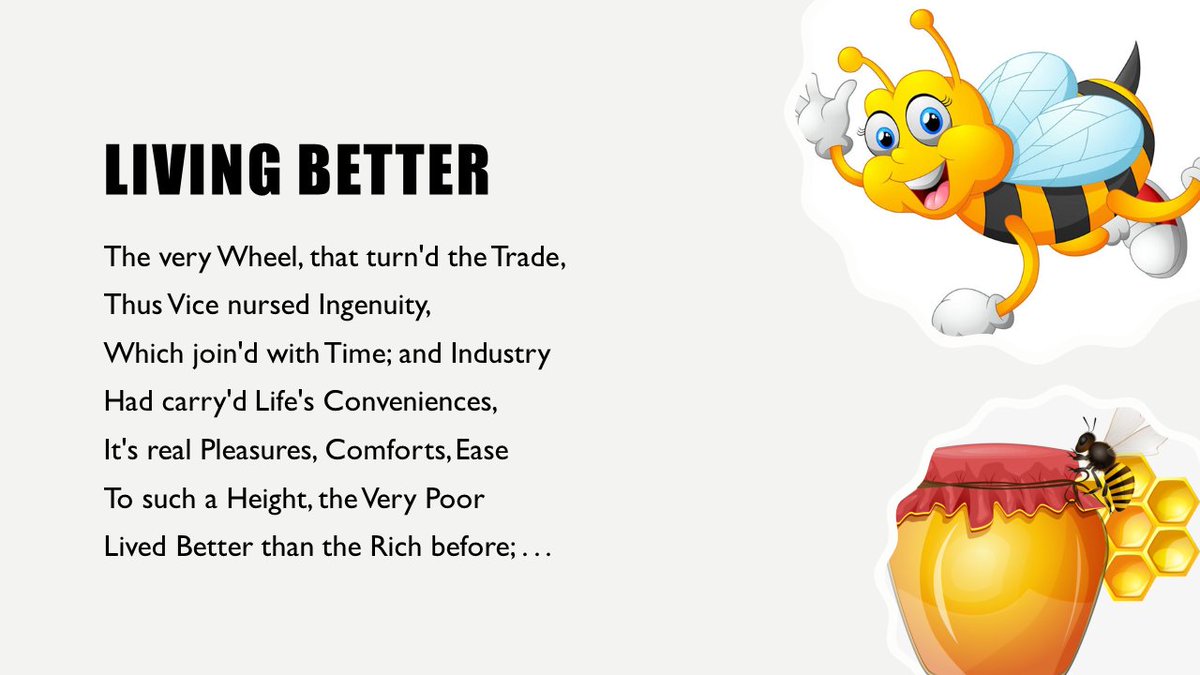
But all that pleasure and ease left the bees wanting more until they demanded selflessness. This angered the God who sought to punish the bees by delivering exactly what they wanted. Jove filled their hearts with Honesty so that now their crimes they were ashamed to see ... 160/ 

As a result, of the imputed selflessness, entire industries were no longer needed, jobs were lost and the economy plummeted. 161/ 
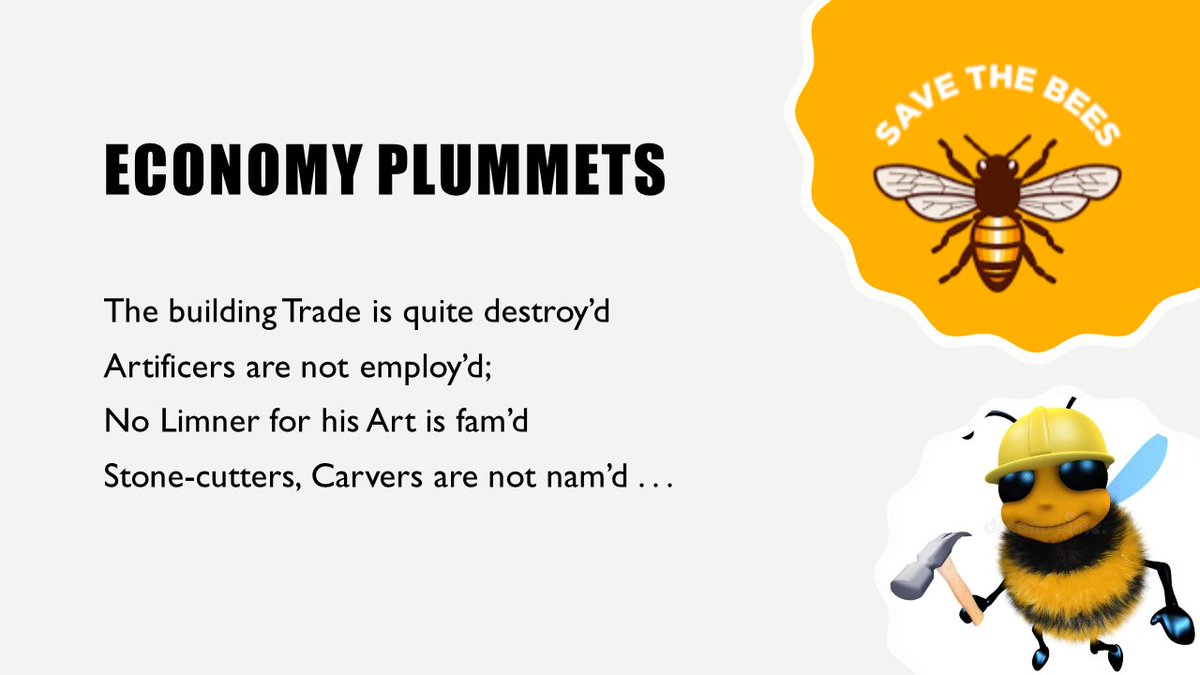
Without vice, ill-gotten furniture must be sold and clothes must be worn for utility not fashion. 162/ 

The moral: prosperous, wealthy and great societies only arise from men's self-interested desires.
Though written 300 years ago, many today still embrace this philosophic rationalization for pursuing their self-interested desires irrespective of the harm they may occasion. 163/
Though written 300 years ago, many today still embrace this philosophic rationalization for pursuing their self-interested desires irrespective of the harm they may occasion. 163/

Belief in Just World (BJW) operates similarly to give wealthy justification for their acts. If the world is just, then they must be just persons to have been bestowed with their wealth and, conversely, those who are poor must've done something to deserve their plight, too. 164/ 

It is Belief in Just World (BJW) that allows Lucy to yank the football away from Charlie Brown over and over again. Because Lucy couldn't derive her pleasure from taking the ball away without Charlie Brown's cooperation, she reasons he must deserve her repeated hijinks. 165/ 

Prosperity Gospel operates similarly to tell the wealthy that God must love them more as they've been bestowed with more material wealth and that if others had more faith in God, they, too, would receive security and prosperity. Homeless persons are told they must atone. 166/ 

Along comes Adam Smith who posits in his Theory of Moral Sentiments (1759), the wealthy would be compelled to evenly distribute their wealth as if directed to do so by an "invisible hand." Homeless persons are proof, however, that this invisible hand doesn't help everyone. 167/ 

The Invisible Hand also fails at equitably distributing housing. "When it's just left up to the market to determine the floor on housing prices, it will go as high as humanly possible." 168/ 

Business Improvement Districts (BIDs) are an Invisible Hand that smacks the homeless away. BIDs participate directly in the criminalization of homeless by employing security personnel whose job it is to exclude or move homeless persons away from their districts. 169/ 

However not all Business Improvement Districts are malevolent. The Downtown DC BID has helped to develop and fund Housing First approaches. To date, they've helped to be part of the solution to homelessness by moving 114 persons into permanent supportive housing! 170/ 
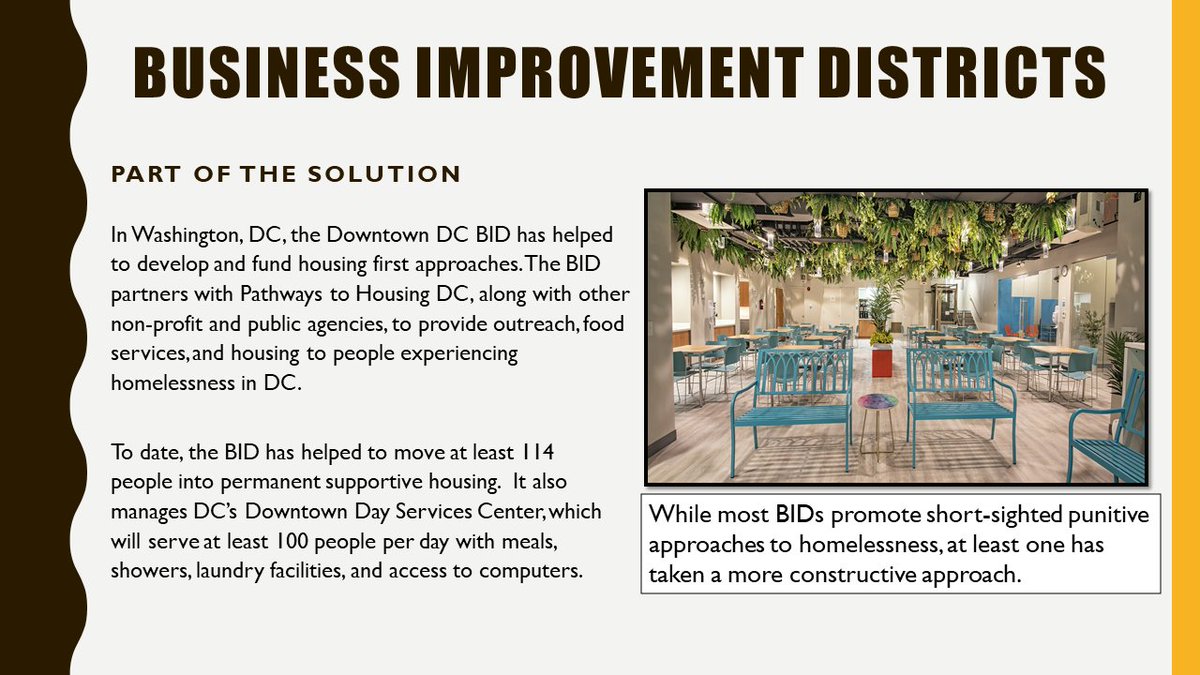
In your estimation, which is the best way to motivate wealthy persons to help the poor: With MONEY: tax incentives or endowments; with SHAME: by besmirching their name publicly; with RECOGNITION: by publicly applauding the good they do. 171/ #Poll #AskMe
Adam Smith wanted to eliminate poverty but not necessarily unequal wealth. He ruminated about what would encourage the wealthy to help the poor and concluded: shame, money and recognition were the primary motivations. 172/ 

Criminalization uses shame and monetary fines to compel persons to accept services they may neither need or want, denying them agency and autonomy. Help that recognizes their human dignity and allows them to make choices without threat of arrest would be better received. 173/ 

Mayor of Redding, CA sought to hold homeless individuals accountable by requiring they submit to forced institutionalization for mental health treatment until such time as the individuals could demonstrate ability to care for themselves including managing their finances. 174/ 
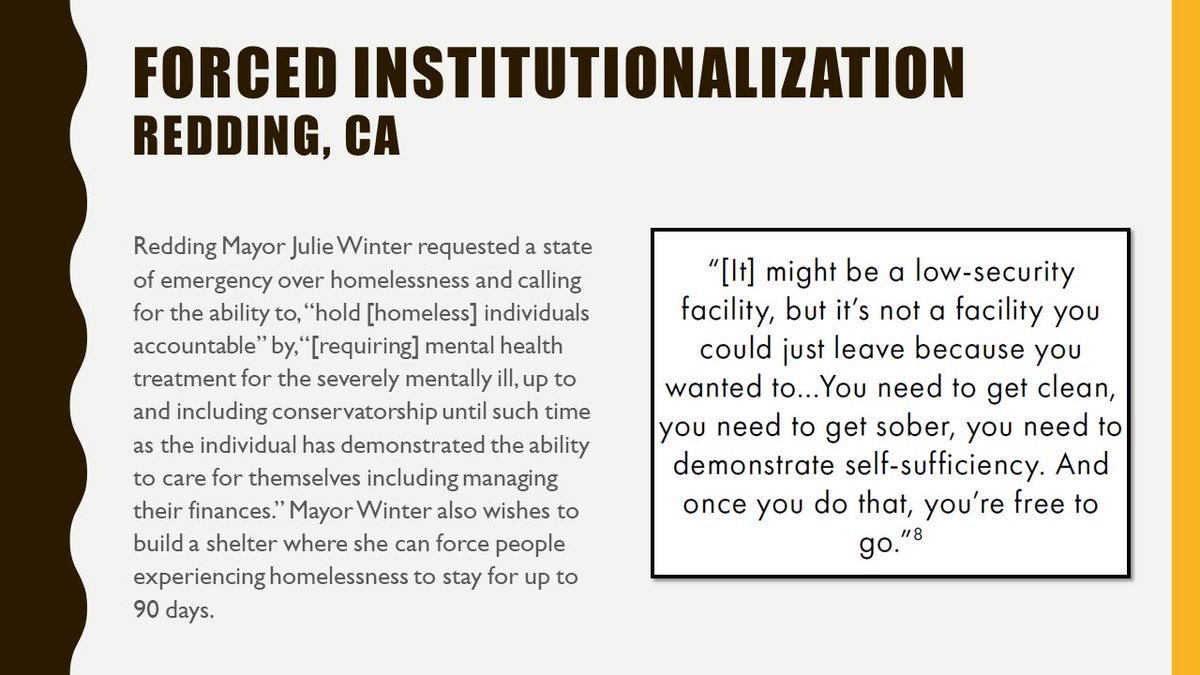
Dramaturgy also provides a framework for understanding city's shameful response to homelessness by hiding persons from public view. Total institutions seek to manage others impressions and treat as a threat those that controvert the image they seek to project. 175/ 
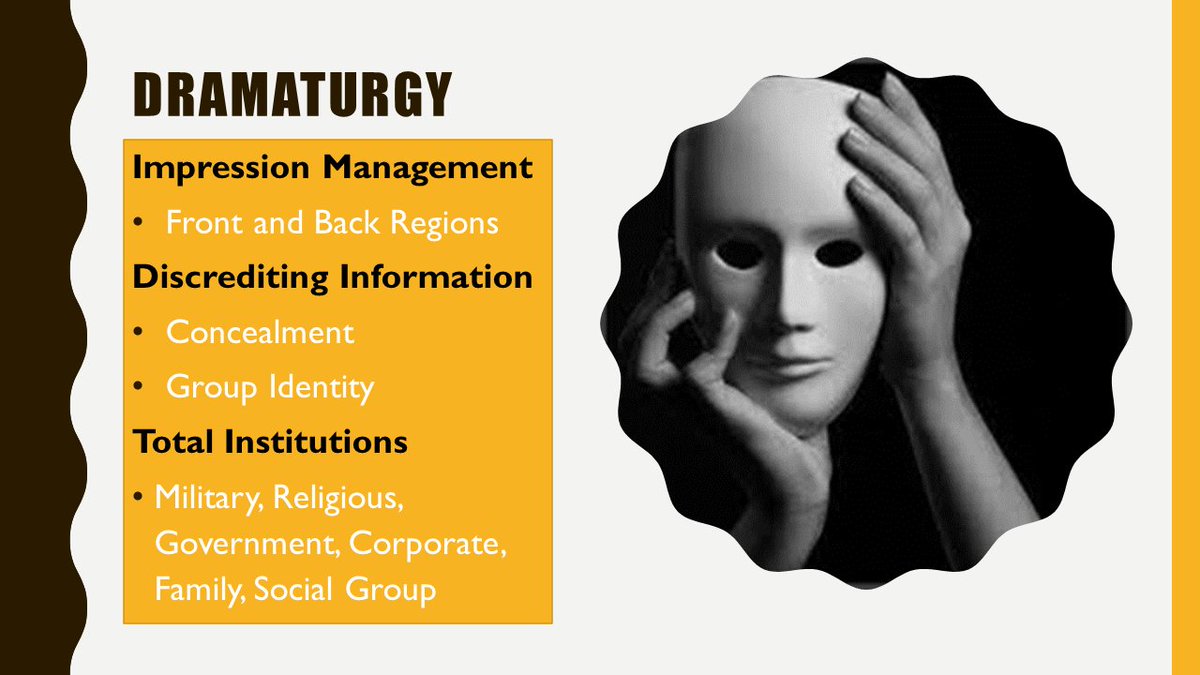
On managed impressions, Adam Smith, proclaimed "the disposition to admire, and ... worship, the rich & the powerful, & to despise, or, at least, to neglect persons of poor and mean condition” is “the great and most universal cause of the corruption of our moral sentiments.”" 176/ 

Under Radical Criminology, the causes of crime are rooted in social conditions that empower wealthy and politically well-organized but disenfranchise others. Solutions involve transforming social conditions. 177/ 

Under Radical-Critical Criminology, criminalization of the homeless occurs as the consequence of ruling class deeming the actions of those experiencing homelessness to be contrary to the self-interests of the wealthy. 178/ 

Under the criminological theory of Chambliss and Seidman, "Law, Order and Power," the conditions of life affect one's values and norms and the greater a group's political or economic position, the greater the probability that its views will be reflected in laws. 179/ 

Marxist Criminology posits that the contradictions of advanced capitalism require oppression of subordinate classes via the legal system and this will continue until the collapse of capitalist society. 180/ 

Black persons have greater risk of homelessness and of likely criminalization. Critical Race Theory teaches "the same rigorous improvement techniques that help communities drive better outcomes can also be used to dismantle the racism that pervades public systems." 181/ 

Left-Realist Criminology believes the criminal justice system is not a pawn of the powerful but that its policing institutions could be made more useful if modifications were made to reduce their use of force and their sensitivity toward the public. 182/ 

Left-Realist Criminology (cont'd) recognizes that crime victims are often poor and disenfranchised who are victimized by criminals with similar backgrounds. The goal of left realism is a just and orderly society through social justice reform. 183/ 

Procedural Justice Theory projects that when police are respectful in their interactions with civilians, they will generate better trust with the community. Laws criminalizing homelessness, in which persons without residence are de-humanized, frustrate such an outcome. 184/ 

Once handed a citation, the homeless person must overcome many obstacles to navigate the court system. "These conditions are extremely difficult for chronically homeless individuals, who are not only poor but also burdened with secondary disabling conditions to meet." 185/ 
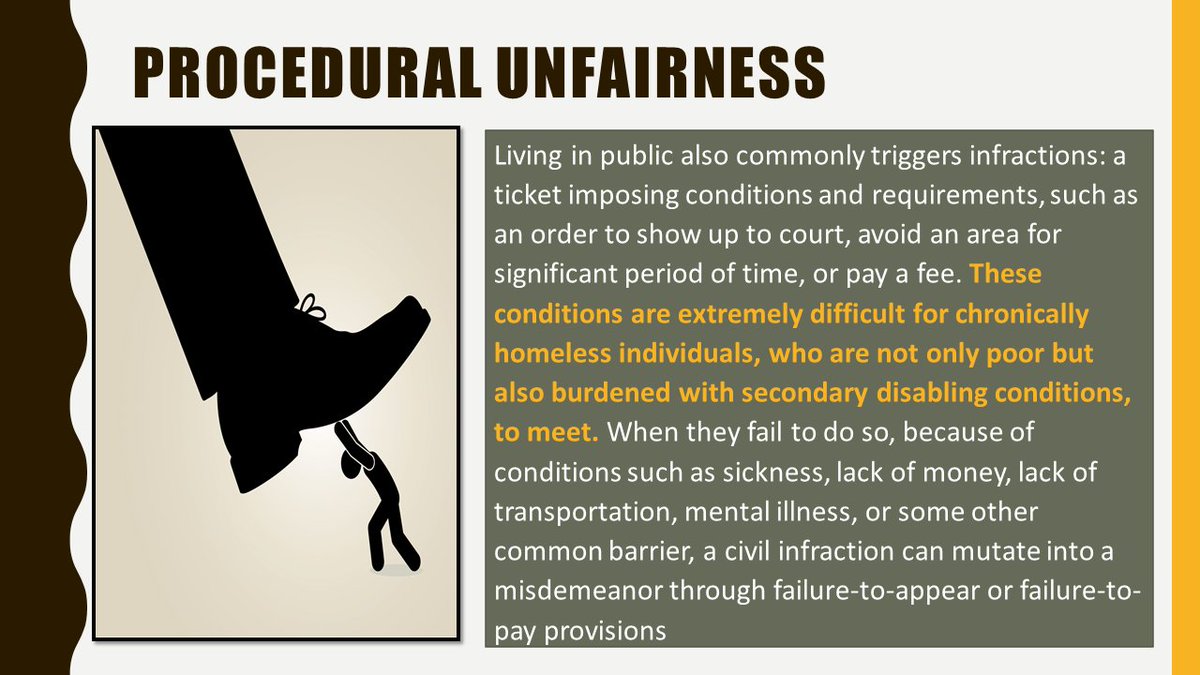
Congratulations! You've reached the end of this long thread. Do you have any questions? 186/
For further reading, check out: nlchp.org/wp-content/upl…
A documentary I highly recommend to learn about private equity's role in causing homelessness is PUSH! vimeo.com/ondemand/pusht…
For further reading, check out: nlchp.org/wp-content/upl…
A documentary I highly recommend to learn about private equity's role in causing homelessness is PUSH! vimeo.com/ondemand/pusht…

• • •
Missing some Tweet in this thread? You can try to
force a refresh





